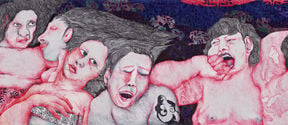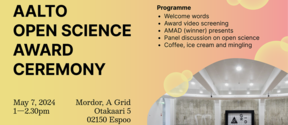Riitta Katila named School of Science Alumna of the Year
Riitta Katila, who works at Stanford University as Professor of Management Science and Engineering, has been selected as School of Science Alumna of the Year 2016. Her area of research is linked to technology strategies and learning: innovations, competition and growth.
Ms Katila's scientific achievements were a deciding factor in her selection for the distinction. Her articles have been published in the strategy and management sector's leading publications, and she has also been on the editorial board of many respected scientific journals. Ms Katila has received numerous awards for her scientific research.
After working as a management consultant and in telecommunications, she grew interested in how corporations create and commercialise their technologies. These questions led her to embark on an academic career in the United States, where she has successfully combined her interests in research with her background in technology and management science.
'The best way to approach innovations is to have an understanding of the technological aspects that act as their driver and the strategic aspects used for their management; my education background provides an excellent starting point for this,' Riitta Katila, who is delighted at her Alumna of the Year distinction, says.
Ground-breaking research on the development of technology-based enterprise
Ms Katila's research has linked two perspectives that are often separate from one another: the birth of innovation within a company and how innovations come to be on the market.
Her research has examined e.g. the factors behind the success of technology corporations. One of the key factors is that a corporation has personnel with the right kind of and versatile expertise for all stages of the innovation process.
'Cooperation between different experts fuels innovation activities. For example, the medical field's technology corporations currently need idea-rich technology experts, such as doctors, who are familiar with the daily use of innovations and want to continuously improve their work. At the same time, there is also a need for business expertise and management-level actors, who know which ideas to select for further development and how these can be altered into products and solutions that improve life,' Ms Katila explains.
Recently, Riitta Katila has researched corporations based in Silicon Valley and, specifically, how an innovation-friendly corporate culture can be cultivated and supported in large corporations. According to Ms Katila, large corporations could learn from startups on how to allow failure and learn from mistakes.
'Many corporations do not want to talk about failure, which can easily stifle testing of new ideas. Startups often feel that it is fine to fail occasionally and do it quickly so that lessons can be learned and success can be achieved the next time,' Ms Katila sums up.
Building bridges between entrepreneurship programmes at Stanford and Aalto
Riitta Katila is a popular visiting lecturer, often also seen at Aalto University, who believes creativity and innovations are important themes also in teaching. Riitta Katila is a long-term participant in the Stanford Technology Ventures Program, which acted as a model and support platform for the Aalto Ventures Program especially when it was first established.
'Aalto University provided a strong technological and scientific base on which to build my expertise, as well as encouraged and motivated me to learn new things. I am grateful for both of these,' says Riitta Katila.
Riitta Katila graduated with a MSc in Industrial Engineering and Management in 1992, and earned a PhD in Technology in 1992 from the Helsinki University of Technology. She also has a PhD in strategy from the University of Texas (2002). In 2002, she started her academic career as an assistant professor at Stanford University, where she is now a professor, researcher and teacher.
Riitta Katila is the third School of Science Alumna of the Year. The Alumna of the Year distinction has previously been granted to Marja-Liisa Siikonen (2015) and Rob Blaauwgeers (2014).
- Published:
- Updated:
Read more news

Aalto ARTS alum Vidha Samya’s artwork featured at the Venice Biennale 2024
The Pavilion of Finland presents ‘The pleasures we choose’ at the 60th International Art Exhibition – La Biennale di Venezia until 24 November 2024.
IoT Forge donates EUR 1 million to the School of Engineering
The donation will be used for research and education on the Industrial Internet and digital twins.
Join us for the first Aalto Open Science Award Ceremony
All Aaltonians are welcome – no registration required!